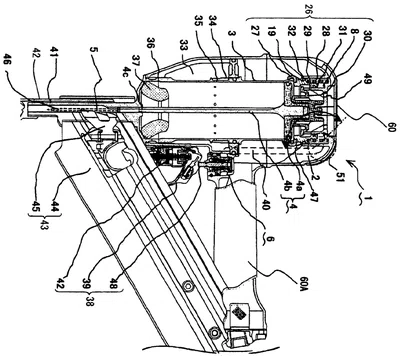
Judge Connolly granted summary judgment of invalidity this week, finding three claims indefinite due to their physical impossibility.
The patent relates to a faster air-powered nail gun, which uses a trigger to control the gun by providing "fluid communication"—i.e., air flow—between air valves.
All of the patent's claims involve triggers and "fluid communication" of various sorts, but defendants picked up on some weird phrasing in one independent claim:
a trigger valve exterior frame to which the main valve control channel is fluidly connected;
Defendants argued that the "exterior frame" is solid and can't be "fluidly connected" to the trigger.
Plaintiffs disagreed, arguing that a person of skill in the art would …
